Answered step by step
Verified Expert Solution
Question
1 Approved Answer
In Hollis vVabu: the court found that the courier of the company was an employee of the company and not an independent contractor. Consequently, the
InHollis vVabu:
- the court found that the courier of the company was an employee of the company and not an independent contractor. Consequently, the company is liable for his conduct within the scope of the business
- the workers were found to be independent contractors because they were not directly employed by the company, and hence the company could not be liable
- each of the agents wore a company uniform but since the perpetrator of the injury could not be identified, the company could not be vicariously liable
- The court found that whether a person was an employee or independent contractor is irrelevant when determining vicarious liability; any wrong makes the company liable
10 points
QUESTION 9
What is the definition of a promoter? Which of the following is correct?
- Every single person, who assists with the promotion of a company, is defined as a promoter, and this would include any lawyer or accountant who advises on the promotion process
- A promoter is the person who brings together the interested parties in order to achieve the registration of a company; they are not just a technical advisor and they do not always need to be directly involved in the formation of the company
- A promoter is a person who is registered as a 'promoter' by ASIC under its registration system, which is open for public view
- A promoter is the person defined within the Corporations Act as usually the first director of the newly formed company
1 points
QUESTION 10
What was the principle to be found in the case ofErlanger v New Sombrero?
- A promoter only needs to disclose that they are transferring property into a company. They do not need to state any profits they make from the promotion process
- A promoter is not considered a fiduciary. Only directors and officers of the company hold that duty once the company is formed
- The promoter must disclose any profits they make from a transaction to an independent board of directors, who represents the interest of the company
- Investors in the company are a separate legal entity and therefore are protected from potential risks of losing money; hence no duty of disclosure of profits exists on the promoter
Step by Step Solution
There are 3 Steps involved in it
Step: 1

Get Instant Access to Expert-Tailored Solutions
See step-by-step solutions with expert insights and AI powered tools for academic success
Step: 2

Step: 3

Ace Your Homework with AI
Get the answers you need in no time with our AI-driven, step-by-step assistance
Get Started


